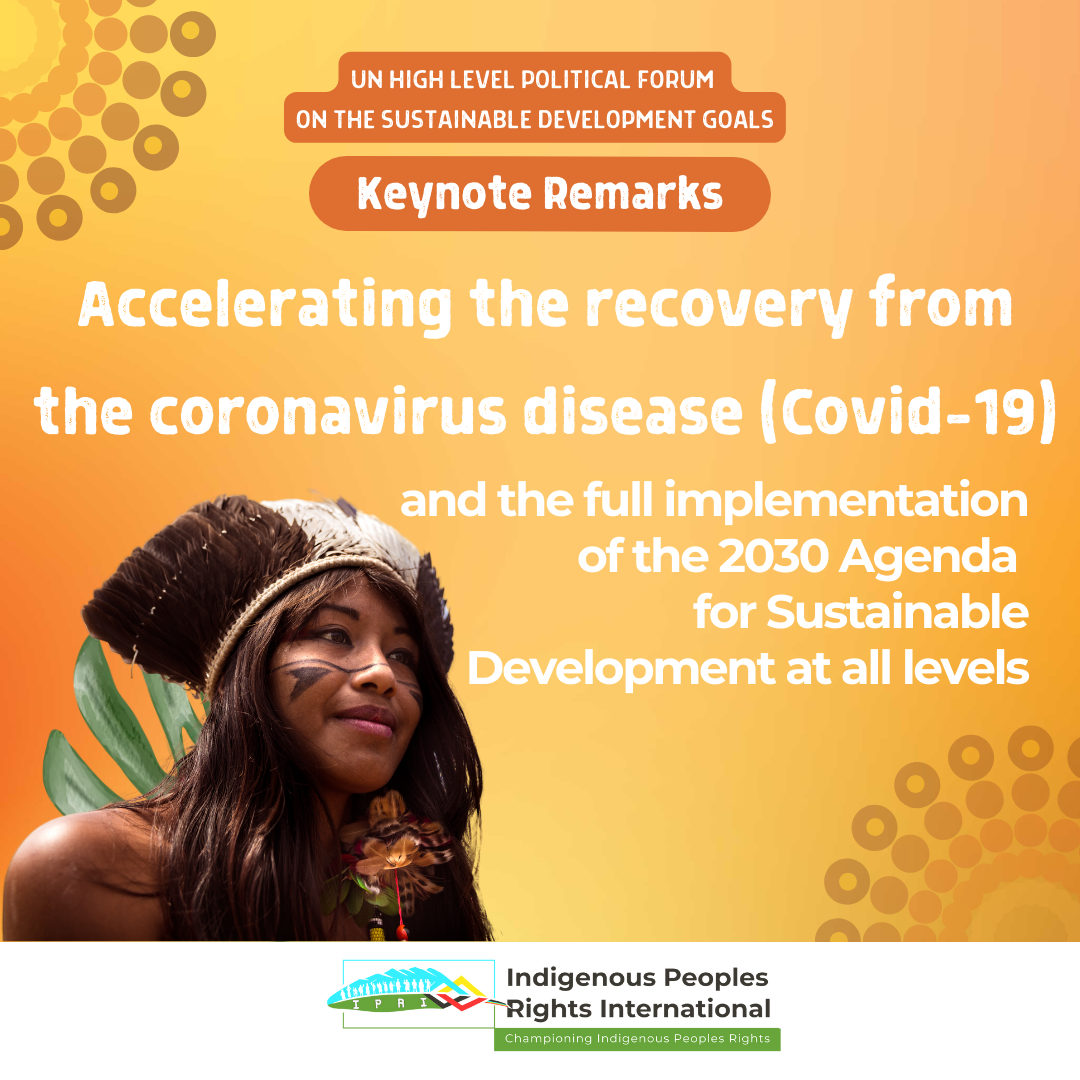UN HIGH LEVEL POLITICAL FORUM ON THE SUSTAINABLE DEVELOPMENT GOALS
Accelerating the recovery from the coronavirus disease (Covid-19)
and the full implementation of the 2030 Agenda for Sustainable Development at all levels.
Major Group and Stakeholders Session
Halfway there, but nowhere near
Need for genuine actions towards inclusive transformation
Keynote remarks by Joan Carling
Indigenous Peoples Rights International(IPRI)
Accelerating recovery from COVID-19 pandemic means that we need actions now to address the underlying structural inequalities and systemic discrimination that have been laid bare by the pandemic. This includes taking decisive actions to tackle the issues of racism, worsening gender disparity and unequal access to healthcare education, livelihood opportunities and social protection for women, indigenous peoples, rural communities, LGTBIQ, refugees, Persons with Disabilities; and communities discriminated on work and descent such as the Dalits, Roma, Haratine, Baraku, Quilombola among others. States and development partners should now prioritize investments in public health systems and infrastructures, inclusive and quality education and digital connectivity without discrimination. Actions on social determinants of good health are critically important, such as access to clean water, nutritious food, and safe housing, to ensure that everyone has the opportunity to lead a healthy life.
The stocktaking of the Major Groups and Stakeholders (MGoS) on the implementation of the SDG indicates that we are halfway there but nowhere near. In fact, economic disparities have deepened in many countries and this is further exacerbated by the impacts of climate change. We need decisive actions now to reverse this trend and close the gaps. This includes transforming the current exploitative and unsustainable economic system to ensure that public interest and welfare are the drivers of an equitable global economic system underpinned by sustainability. It also includes the implementation of mandatory policies and measures for responsible and accountable business and for equitable trade relations and agreements.
Likewise, effective participatory mechanisms for the economic empowerment of marginalized and discriminated communities is imperative to reach those furthest left behind. This includes recognizing and protecting the rights of indigenous peoples to our lands, territories and resources, to free prior and informed consent and to self-determined development. Likewise, mobilization of adequate resources to support these actions , and transparency and accountability in resource allocation and implementation is a requisite . Developed countries should now fulfill their commitments on Official Development Assistance (ODA) and debt relief, and to share resources and appropriate technologies to benefit the poor and discriminated communities.
The rise of authoritarian states and shrinking democratic space, as well as unabated corruption are resulting in widespread human rights violations with impunity; and seriously undermining the effective participation of civil society in sustainable development processes and access to justice. States need to provide an enabling environment and effective mechanisms for citizens participation at the local and national levels NOW. We cannot achieve the SDGs without the meaningful participation of civil society, including rightsholders and discriminated communities.
Climate change, biodiversity loss, and environmental degradation are pressing issues undermining advances in the implementation of the SDGs. Carbon markets and net zero emission targets are not real solutions as they do not fully address the needed reduction of carbon emission. Further, it is necessary to underpin the just transition with human rights protection, social equity and sustainability instead of business as usual for the energy and extractive industries. We need strong global solidarity, cooperation and leadership by states in the allocation of adequate finance including for loss and damages, for transfer of technology; and to fully recognize and support the rights and contributions of indigenous peoples in biodiversity and environmental protection; as well as the initiatives and actions of marginalized sectors in building their resilience.
We are now halfway through but still way behind the goals we set in 2015. Instead of paying lip service, it is urgent for us to turn the pledge of leaving no one behind into meaningful partnerships and actions, actions, actions.
Thank you.


%2020.49.20.png)
